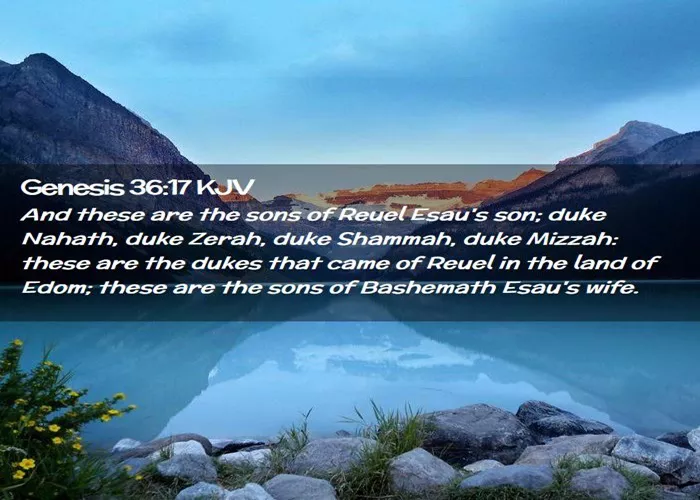Read the Daily Bible Verse – Genesis 36:17 To Strengthen Your Spiritual Journey.
Genesis 36 is primarily a genealogical account, detailing the descendants of Esau, who is also known as Edom. This chapter serves to illustrate the growth of Esau’s lineage and the establishment of the Edomite nation. The passage highlights not just names, but also the implications of family ties and territorial divisions in the ancient Near East.
Esau, the twin brother of Jacob, represents a significant figure in the narrative of the Israelites, as his descendants, the Edomites, played a pivotal role in the region’s history. The lineage outlined in Genesis 36:17 particularly focuses on the sons of Esau and their contributions to the tribal structure that would later characterize Edom.
Verse 17 reads as follows in the King James Version (KJV): “And these are the sons of Reuel; Nahath, and Zerah, Shammah, and Mizzah: these are the sons of Reuel, Esau’s son.” This verse details the sons of Reuel, one of Esau’s sons, establishing the continuity of Esau’s lineage.
The Genesis 36:17 Meaning
In examining Genesis 36:17, we find several layers of meaning. The mention of Reuel’s sons signifies not just the continuation of Esau’s bloodline but also the importance of familial ties in the ancient context. Each name listed carries with it the weight of identity, heritage, and tribal association.
Historical Significance
The descendants of Esau, including Reuel, were part of the broader Edomite identity, which was critical in the historical and political landscape of the region. Understanding this genealogy provides insights into the sociopolitical dynamics of ancient Israel and its neighbors.
Theological Implications
From a theological standpoint, Genesis 36:17 illustrates God’s sovereignty over the lineage and the unfolding of His plans through specific families. The mention of Esau’s lineage affirms the idea that God works through diverse nations and peoples, emphasizing His universal reach in history.
Genesis 36:17 Application in Life
The application of Genesis 36:17 extends beyond historical and theological analysis; it can be reflected in contemporary life in various ways.
Emphasizing Heritage
Understanding our lineage can instill a sense of pride and identity. Just as Esau’s descendants are remembered, individuals today can appreciate their own family histories and the unique traits they inherit. This awareness can foster a sense of belonging and continuity in a fast-paced, ever-changing world.
The Importance of Family
The verse underscores the value of family connections. In an age where individualism often reigns, Genesis 36:17 reminds us of the significance of our familial ties. Engaging with family history can enrich our lives and provide a foundation for understanding our current identities.
Recognizing Diversity
Genesis 36 also serves as a reminder of the diversity within God’s creation. The varied lineages illustrate that different cultures and peoples all play a role in God’s plan. Embracing diversity can lead to greater compassion and understanding in our modern interactions.
Comparison with Other Biblical Texts
The genealogies found in Genesis 36 can be compared with other genealogical accounts in the Bible, notably those in Genesis 5 and Matthew 1.
Genesis 5
In Genesis 5, we see a different focus on the lineage from Adam to Noah, emphasizing the faithful remnant through which God’s promises were passed. Unlike Genesis 36:17, which highlights the lineage of a nation, Genesis 5 underscores the importance of faithfulness across generations.
Matthew 1
Matthew 1 provides a genealogy of Jesus Christ, linking Him to both Abraham and David. This account emphasizes the fulfillment of God’s promises through specific lineages. While Genesis 36:17 reveals the descendants of Esau, Matthew 1 highlights the significance of lineage in the context of salvation history.
Thematic Comparisons
Both Genesis 5 and Matthew 1 offer insights into God’s covenantal faithfulness, albeit from different perspectives. Genesis 36:17 reminds us that God’s work is not confined to one lineage but encompasses many, thus broadening our understanding of His plans.
Modern-Day Relevance
In today’s world, the themes presented in Genesis 36:17 resonate with various societal issues.
Identity and Belonging
In an era marked by globalization, the quest for identity can often lead individuals to explore their roots. Genesis 36:17 can encourage people to seek out their heritage, fostering a sense of belonging in a diverse world.
Family Dynamics
As family structures evolve, the emphasis on heritage and family ties remains relevant. Genesis 36:17 serves as a reminder of the importance of family in shaping identity and community. Modern challenges such as family fragmentation highlight the need for connection and understanding among family members.
Cross-Cultural Understanding
The diversity of lineages in Genesis 36 encourages a broader appreciation of different cultures and backgrounds. In our multicultural society, recognizing the value in each lineage can promote unity and cooperation among diverse groups.
Conclusion
Genesis 36:17 may appear to be a simple genealogical note, but its implications stretch far beyond the text. Through understanding the context, meaning, and application of this verse, we gain valuable insights into heritage, family, and the overarching narrative of God’s involvement in human history.
By comparing it with other biblical texts and reflecting on its modern-day relevance, we see that these ancient accounts still hold significance today. They remind us of our shared humanity, the importance of our roots, and the diversity that enriches our communities.
Genesis 36:17 Commentary
In conclusion, Genesis 36:17 encapsulates a significant moment in the biblical narrative. It connects the past with the present, illustrating the enduring importance of lineage, heritage, and identity in our lives. As we reflect on this verse, we are invited to consider our place within the broader tapestry of human history, acknowledging both our unique identities and our connections to one another. Through this lens, we can appreciate the beauty of God’s creation, where every lineage plays a role in the unfolding story of humanity.
Related topics:
- Genesis 36:16 Meaning, Context & Commentary
- What does Genesis 36:15 Mean?
- Genesis 36:14 Meaning, Context & Commentary

